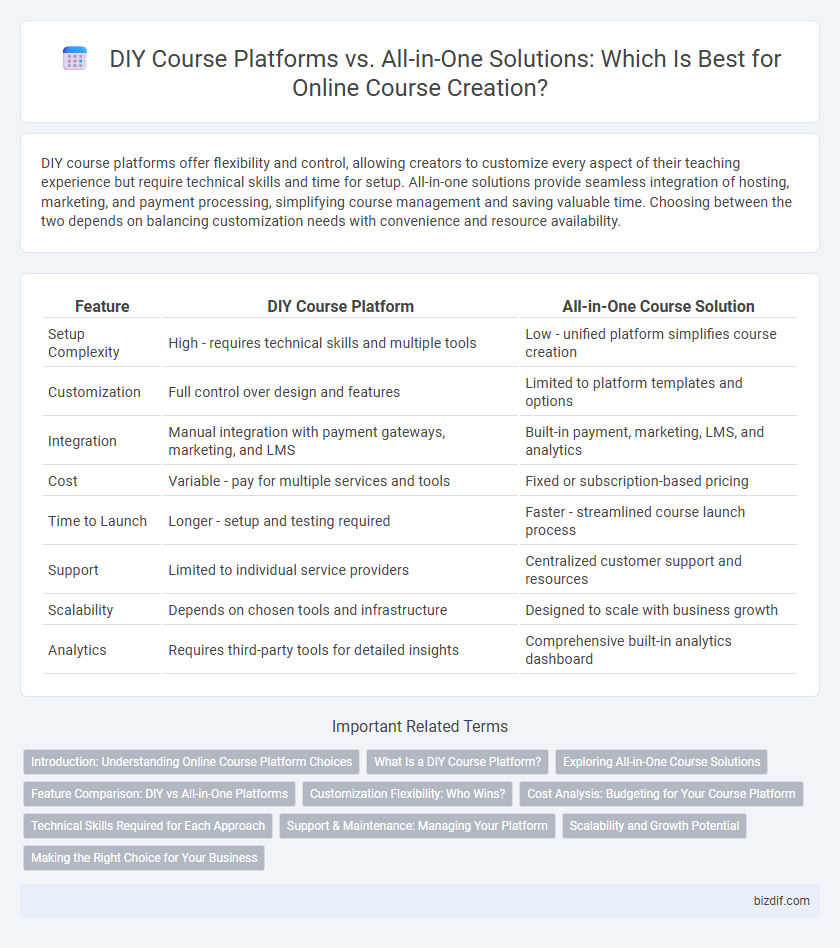DIY course platforms offer flexibility and control, allowing creators to customize every aspect of their teaching experience but require technical skills and time for setup. All-in-one solutions provide seamless integration of hosting, marketing, and payment processing, simplifying course management and saving valuable time. Choosing between the two depends on balancing customization needs with convenience and resource availability.
Table of Comparison
| Feature | DIY Course Platform | All-in-One Course Solution |
|---|---|---|
| Setup Complexity | High - requires technical skills and multiple tools | Low - unified platform simplifies course creation |
| Customization | Full control over design and features | Limited to platform templates and options |
| Integration | Manual integration with payment gateways, marketing, and LMS | Built-in payment, marketing, LMS, and analytics |
| Cost | Variable - pay for multiple services and tools | Fixed or subscription-based pricing |
| Time to Launch | Longer - setup and testing required | Faster - streamlined course launch process |
| Support | Limited to individual service providers | Centralized customer support and resources |
| Scalability | Depends on chosen tools and infrastructure | Designed to scale with business growth |
| Analytics | Requires third-party tools for detailed insights | Comprehensive built-in analytics dashboard |
Introduction: Understanding Online Course Platform Choices
Choosing between a DIY course platform and an all-in-one solution significantly impacts course creation efficiency and scalability. DIY platforms offer greater customization and control over branding, ideal for experienced creators wanting specific features. All-in-one solutions provide integrated tools such as hosting, payment processing, and marketing automation, streamlining workflows for beginners and busy professionals.
What Is a DIY Course Platform?
A DIY course platform is a self-service tool that enables creators to design, publish, and manage online courses independently, offering maximum control over content and customization. These platforms typically require users to handle technical aspects such as hosting, payment processing, and marketing integration on their own. Compared to all-in-one solutions, DIY platforms provide greater flexibility but demand more time and expertise to build a comprehensive online learning experience.
Exploring All-in-One Course Solutions
All-in-one course solutions streamline online course creation by integrating content hosting, payment processing, and student management into a single platform, reducing technical complexity for creators. These platforms often include marketing tools, analytics, and customizable design options, enabling educators to optimize user experience and increase course sales. Compared to DIY course platforms that require multiple third-party services, all-in-one solutions enhance efficiency and scalability for professional course delivery.
Feature Comparison: DIY vs All-in-One Platforms
DIY course platforms offer customizable tools for content creation, marketing, and student engagement, allowing creators to tailor every aspect of their course but often require technical skills and integration of third-party services. All-in-one solutions provide integrated features such as website hosting, payment processing, email marketing, and analytics within a single platform, streamlining the course creation process and reducing setup time. The choice between DIY and all-in-one platforms depends on the creator's need for flexibility versus convenience and ease of use.
Customization Flexibility: Who Wins?
DIY course platforms offer extensive customization flexibility, allowing creators to tailor every aspect of their online courses, from design to functionality, according to their unique brand and pedagogical needs. All-in-one solutions provide streamlined, pre-built templates and integrated tools that simplify course creation but often limit the depth of customization available. For educators prioritizing granular control and unique branding, DIY platforms generally win in customization flexibility.
Cost Analysis: Budgeting for Your Course Platform
DIY course platforms often require lower upfront costs but may incur higher long-term expenses due to separate subscriptions for hosting, marketing tools, and payment processing. All-in-one solutions consolidate these features within a single subscription, providing predictable monthly costs and potentially reducing overall expenses by eliminating third-party fees. Careful budgeting should account for platform fees, transaction rates, and scalability to choose the most cost-effective option aligned with course growth plans.
Technical Skills Required for Each Approach
DIY course platforms require strong technical skills in website design, server management, and software integration to build and maintain a fully customized learning environment. All-in-one solutions minimize the need for coding by offering pre-built templates, automated hosting, and integrated marketing tools, allowing creators to focus on content rather than technical infrastructure. Choosing the right approach depends on the creator's proficiency with web technologies and desire for control over platform functionality.
Support & Maintenance: Managing Your Platform
DIY course platforms often require users to handle technical support and ongoing maintenance independently, which can lead to increased time and resource investment. All-in-one solutions provide dedicated support teams and automate updates, ensuring seamless platform performance and reducing downtime. Choosing an all-in-one platform minimizes the burden of technical troubleshooting, allowing course creators to focus on content quality and student engagement.
Scalability and Growth Potential
DIY course platforms offer flexibility and customization but often lack scalable infrastructure, limiting growth when user demand increases. All-in-one solutions provide integrated tools for marketing, analytics, and onboarding that support rapid scaling and sustained expansion. Investing in a comprehensive platform enhances long-term growth potential by streamlining operations and accommodating increasing course enrollment.
Making the Right Choice for Your Business
Choosing between a DIY course platform and an all-in-one solution depends on your business needs, technical skills, and budget. DIY platforms offer greater customization and control but require more time and effort to manage, while all-in-one solutions provide integrated tools like marketing, payment, and analytics for seamless course delivery. Prioritizing scalability, user experience, and support options ensures the best fit for long-term growth and profitability in your online course business.
DIY course platform vs All-in-one solution Infographic

 bizdif.com
bizdif.com